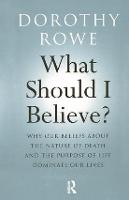


|
|
|
books
| book details |
What Should I Believe?: Why Our Beliefs about the Nature of Death and the Purpose of Life Dominate Our Lives
By (author) Dorothy Rowe

|
This book is currently unavailable. Enquire to check if we can source a used copy
|
| book description |
Suddenly, in the twenty-first century, religion has become a political power. It affects us all, whether we’re religious or not. If we’re not in danger of being blown up by a suicide bomber we’ve got leaders to whom God speaks, ordering them to start a war. We’re beset by people who demand that we give ourselves to Jesus while they smugly assure us of their own superiority and inherent goodness. We’re surrounded by those who noisily reject science while making full use of the benefits science brings; by the ‘spiritual’ ones; the ones who believe in magic; and there’s the militant atheists berating us all for our stupidity. We wouldn’t object to what people believed if only they’d keep it to themselves. We want to make up our own minds about what we believe, but it’s difficult to do this. Everyone has to face the dilemma that we all die but no one knows for certain what death actually is. Is it the end of our identity or a doorway to another life? Whichever we choose, our choice is a fantasy that determines the purpose of our life. If death is the end of our identity, we have to make this life satisfactory, whatever ‘satisfactory’ might mean to us. If it is a doorway to another life, what are the standards we have to reach to go to that better life? All religions promise to overcome death, but there’s no set of religious or philosophical beliefs that ensures that our life is always happy and secure. Moreover, for many of us, what we were taught about a religion severely diminished our self-confidence and left us with a constant debilitating feeling of guilt and shame. Through all this turmoil comes the calm, clear voice of eminent psychologist Dorothy Rowe. She separates the political from the personal, the power-seeking from the compassionate. She shows how, if we use our beliefs as a defence against our feelings of worthlessness, we feel compelled to force our beliefs on to other people by coercion or aggression. However, it is possible to create a set of beliefs, expressed in the religious or philosophical metaphors most meaningful to us, which allow us to live at peace with ourselves and other people, to feel strong in ourselves without having to remain a child forever dependent on some supernatural power, and to face life with courage and optimism.
| product details |
Normally shipped |
Publisher | Taylor & Francis Ltd
Published date | 1 Sep 2016
Language |
Format | Hardback
Pages | 312
Dimensions | 198 x 129 x 0mm (L x W x H)
Weight | 453g
ISBN | 978-1-1381-5147-5
Readership Age |
BISAC | psychology / psychotherapy / general
| other options |
|
|
|
To view the items in your trolley please sign in.
| sign in |
|
|
|
| specials |
|
|
|
This first comprehensive biography of Cecil Rhodes in a generation illuminates Rhodes’s vision for the expansion of imperialism in southern Africa, connecting politics and industry to internal development, and examines how this fueled a lasting, white-dominated colonial society.
|
Let's stare the future down and, instead of fearing AI, become solutionists.
|
|
|
|